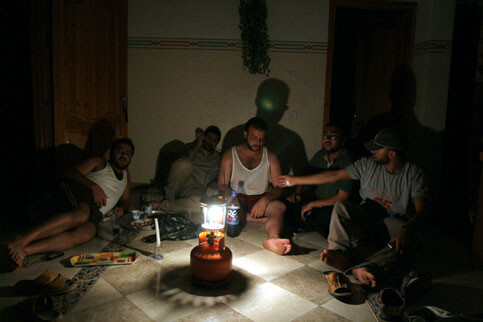Maghazi refugee camp 17 July 2006

Members of a Palestinian family gather around a lamp at their house in Gaza City 17 July 2006. Gaza Strip has been without power since Israeli warplanes struck Gaza’s electricity station on 17 June 2006. (MaanImages/Wesam Saleh)
“I have lost a total of $1,000 US dollars since the power supply has been cut, the number of my customers has decreased to minimum, I stay idle at my shop for long hours; what shall I do?” asked 31-year-old Alaa’ Salahat, a local vendor of frozen foods from the central Gaza Strip refugee camp of Maghazi. He spoke of his experience while sitting in the darkness with only a kerosene lamp illuminating the worry lines in his face. Why such darkness? Because three weeks ago, Israeli aircrafts bombarded Gaza’s power plant.
“This is really a very terrible situation; we are civilians - what does Israel want? This is really a collective punishment against an entire people,” said Alaa’.
“When I get back home each day having earned only a few shekels [Israeli currency - 5 shekels = $1 US] in my pocket, I rush to find candles to light the house for my wife. We stay idle, until our turn for electricity current comes. This ‘luxury’ happens no more than three nights a week,” he continued.
“This is a really unbearable situation that nobody on this earth can tolerate. What do the Israelis want us to do? To die, to give up, or what? However, we are steadfast. You know why we are steadfast? Because we know we have the same right to exist as the Israelis. These are our ancestors’ lands, and we will remain living here - even if it is difficult, even if we don’t want to stay. Because this is our land.” At this last sentence, Alaa’ emphasized each word, to make sure I understood what he meant.
In the southern Gaza Strip city of Khan Younis, where the same problem exists, a Palestinian mother, Taraji Qdaih, 32, said, “For a very long time, we have been calling on the world to help us get rid of the Israeli occupation, but all our appeals fall on deaf ears. The Israelis are committing massacres; from the girl Huda Ghalia’s family, massacred on Beit Lahia beach a few weeks ago, to the missiles fired at us from the air by night and day. And there is not any condemnation from the world at all. Yet when an Israeli soldier has been held, all the countries want to intervene to free him without any concessions. We are always the ones blamed, we are always the ones blamed.”
Visiting the ruins of the bombed power plant brings to light the reality of Israeli shelling. Dr. Derar Abu Sasi, the plant’s operations director said during a visit to his wrecked office at the base of the plant, “We only have one power plant in Gaza. Now that Israel has destroyed it, we can’t produce a single megawatt, or even a kilowatt for our customers. The Israeli bombs destroyed all four main transformers, the only transformers that feed Gaza residents with electricity.”
Israeli warplanes have been bombarding and destroying major infrastructure in the Gaza Strip such as governmental buildings for three weeks straight - the latest was the foreign affairs ministry, hit early in the morning of Monday, July 17, for the second time in a week. Water treatment plants and greenhouses, bridges and homes, have also been the major targets of Israeli bombs in ‘Operation Summer Rain,’ the code name for the Israeli military invasion of Gaza that began 27 June.
Israeli leaders claim that their actions across Gaza are intended at freeing an Israeli soldier who has been held by some Palestinian resistance groups for the past three weeks after he was captured in an unprecedented resistance attack on an Israeli army base south of the Gaza Strip.
The United States, Israel’s strategic ally, has considered Israel’s ongoing attacks on Gaza Strip as ‘self defense,’ while the death toll amongst Palestinians since then has risen to nearly 100, with over 300 others wounded, some of them are very critical. Some of the injured have lost limbs or have been paralyzed for life. In contrast, a sole Israeli soldier was killed in the Gaza invasion, and although Israeli forces at first blamed Palestinian resistance fighters, they later determined that the soldier had been shot by ‘friendly fire.’
Related Links
Rami Almeghari is currently a Senior Translator at the Translation Department of the Gaza-based State Information Service (SIS) and former Editor in Chief of the SIS-linked International Press Center’s English site. He can be contacted at rami_almeghari@hotmail.com





